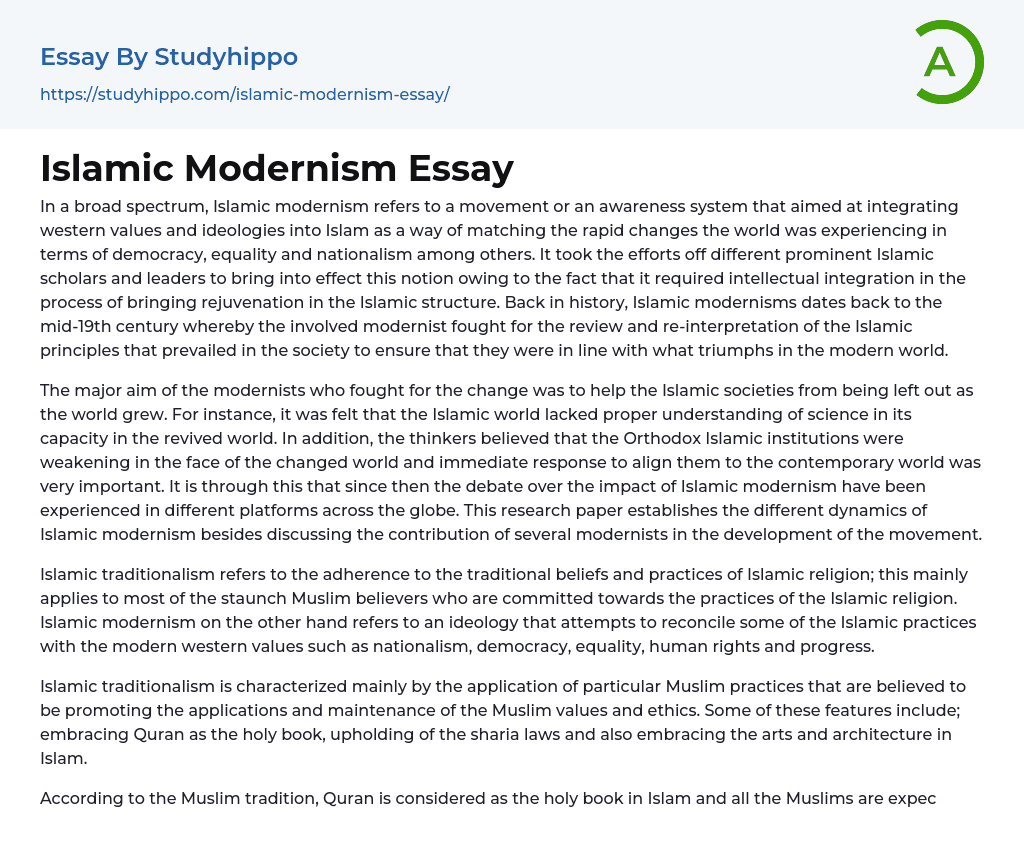In general, Islamic modernism refers to a movement or system that sought to incorporate western values and ideologies into Islam. The purpose was to align with the global changes in democracy, equality, nationalism, and other areas.
Prominent Islamic scholars and leaders worked together to bring about this notion, as it required intellectual integration to rejuvenate the Islamic structure. Islamic modernism dates back to the mid-19th century, when modernists sought to review and reinterpret the prevailing Islamic principles in line with the modern world. The modernists aimed to prevent Islamic societies from being left behind as the world progressed. They believed that the Islamic world lacked a proper understanding of science in the modern era. Furthermore, they saw the Orthodox Islamic institutions as weakening in the face of a changing world, and believed it was crucial to align them with contemporary society.
The impact of Islamic
...modernism has been debated across various global platforms. This research paper examines the dynamics and contributions of modernists in the development of this movement. Islamic traditionalism, on the other hand, refers to adhering to traditional beliefs and practices of Islam. This primarily applies to devout Muslim believers who are committed to Islamic practices. In contrast, Islamic modernism aims to reconcile certain Islamic practices with Western values like nationalism, democracy, equality, human rights, and progress. Essentially, Islamic traditionalism emphasizes specific Muslim practices that uphold Muslim values and ethics.
Traditional Islam encompasses various aspects such as the acceptance of Quran as the sacred text, adherence to sharia laws, and appreciation for arts and architecture. In accordance with Muslim tradition, Quran holds significant importance in Islam and all followers are obligated to follow its teachings without
hesitation. Additionally, traditional Muslims uphold and enforce sharia laws, which are considered divine principles guiding moral conduct among Muslims (Smith, 1991).
Both Islamic modernism and Islamic traditionalism share a reverence for the Quran, which is considered the holy book through which God communicates to humanity. Despite some finding traditional Muslim art and architecture unappealing in their buildings and clothing, Islamic modernism has incorporated elements from traditionalism in different ways. As previously stated, Islamic modernism advocates for incorporating flexibility and a dynamic approach to Islamic practices. This influence has been observed to shape important historical events in Islam.
The thinkers' efforts to modernize Islam led to significant changes. People embraced equality, transforming their lifestyles. Islamic modernism played a crucial role in the integration of modern education in the Muslim world, resulting in many Muslims migrating to western countries for educational opportunities. This migration contributed to the development of various national and local sectors. Historical records from 1945 reveal that a large number of Muslims had relocated to other nations in pursuit of education.
The modernism movement in various Islamic countries resulted in the adoption of democracy and nationalism, as well as the promotion of tolerance in leadership. Several studies suggest that the Sareket Islam, established in Southeast Asia during the 19th century, emerged as a result of Islamic modernization. The goal of this organization was to modernize society and move away from traditional values. Although there are critics who argue that the rise of Muslim extremists can be attributed to the impact of modernization, conclusive evidence supporting this relationship is currently lacking. Jamal Al-Di Afghani is widely acknowledged as a significant contributor and catalyst for Islamic Modernism.
Jamal Al-Di Afghani,
a prominent critic of traditional practices in the Muslim world, advocated for societal reform and development. Despite his strong Islamic faith, he disagreed with those who criticized Western values, as he believed that certain Western ideologies could actually strengthen Islam. Afghani aimed to align Islamic laws with modern values in order to bring about this change.
His philosophy emphasized the promotion of unity, nationalism, and open-mindedness by rejecting a retrograde mentality. The dedication and perseverance exhibited by two influential Muslims in history illustrate the necessity of commitment in various circumstances for Islamic modernism. The integration of Islamic modernism into Islam has resulted in the growth of specific elements that foster peaceful coexistence among Muslims and other religious communities within society. Islamic modernism has played a pivotal role in effecting substantial reforms in the Muslim world, resulting in enhancements to communal living.
- Quran essays
- Al-Qaeda essays
- Muhammad essays
- Muslim essays
- Ali essays
- Ramadan essays
- Afterlife essays
- Atheism essays
- Bible essays
- Buddhism essays
- Christian Worldview essays
- Christianity essays
- Confession essays
- Cosmological Argument essays
- Deism essays
- Devil essays
- Existence of God essays
- Faith essays
- Freedom Of Religion essays
- God essays
- Hinduism essays
- Immortality essays
- Islam essays
- Jainism essays
- Jews essays
- Judaism essays
- Miracle essays
- Monk essays
- Monotheism essays
- New Testament essays
- Old Testament essays
- Pilgrimage essays
- Puritans essays
- Revelation essays
- Ritual essays
- Salvation essays
- Sin essays
- Sinners essays
- Soul essays
- Taoism essays
- Temple essays
- Theology essays
- Aesthetics essays
- Art History essays
- Artist essays
- ballet essays
- Body Art essays
- Color essays
- Concert Review essays
- Creativity essays




